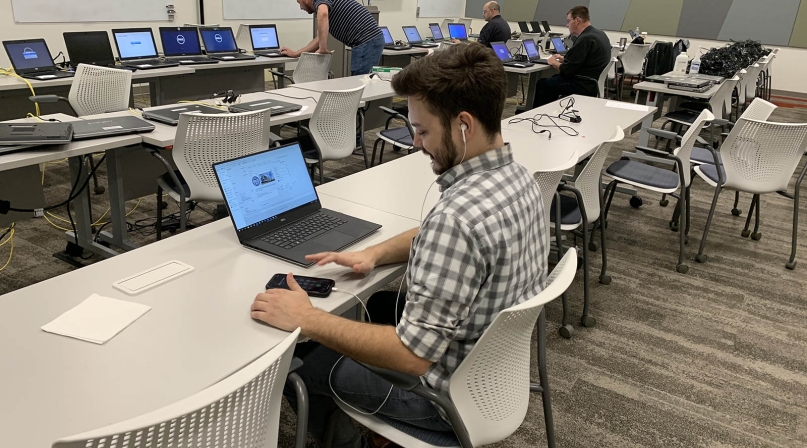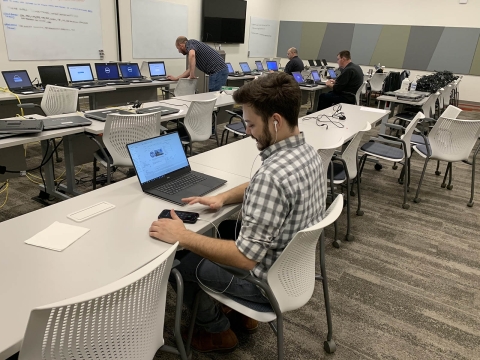Counties get creative to navigate coronavirus crisis

Dealing with the coronavirus has meant rethinking operations for many counties, from limiting public interactions to “flatten the curve,” rethinking service delivery and assessing personnel.
Hennepin County, Minn. Manager Dave Hough sees a potential for long-term improvement in county operations.
“Right now, we’re trying to determine how we create workarounds and in crisis situations,” he said. “Sometimes you are able to develop new strategies, to innovate in a way that you ordinarily wouldn’t in a non-crisis scenario. Our folks are doing a lot of imagining and innovating to get us to where we’re starting to feel comfortable and confident that we can deliver service remotely.”
Hennepin County has closed 41 libraries, 18 human service satellite offices and six service centers, though some are available for appointments.
“We did that to be proactive because of what we were seeing on the East Coast and the West Coast,” he said. “I wanted to be out ahead of this.”
In making the county work in its current limited public-facing capacity, he hopes at least some short-term operating procedures could find their way to becoming standard if they weather the storm.
“Frankly, these are situations where we can assess and determine the best ways to deliver service so that we could innovate,” he said. “It’s very challenging from the standpoint of not knowing what’s going to happen, but it’s also very energizing.”
Farther north, St. Louis County in Minnesota is accelerating its approach to teleworking, and in the three days leading up to the Board of Commissioners approving a measure allowing county administrators to define and implement strategies, departments worked “aggressively” to prepare guidance, The News Tribune reported.
In addition, the county’s human resources department has been retrofitting public-facing facilities, including installing Plexiglas at the cashier window in the auditor’s office.
Kosciusko County, Ind. is hoping to keep offices open, while also trying to reduce public gatherings in its buildings. Commission President Brad Jackson told The Times Union that he hoped people would call ahead and only come into county buildings if they had to.
“We’re not closing, but we are putting restrictions in place and putting counters out in the hallways,” Jackson said. “We’re trying to avoid shutting down by people only coming in if absolutely necessary.”
In dense Arlington County, in Virginia, the county is closing all dog parks, fields and playgrounds, locking them down to prevent spread of the virus. Trails and community gardens are open to individuals only.
Inyo County, Calif.’s tourism office — Explore Inyo County — had an abrupt change in mission, broadcasting on Instagram: “Please go home. Under normal circumstances we welcome tourists with open arms but there is a global public health emergency in progress, and we need to politely request that you return to your primary address — your home.”
It’s with good reason. “Our hospitals, services and supply chains are under immense strain and they simply cannot cope with the extra demands placed upon them by an added influx of visitors to the area. So please go home for the time being and come back to see us when this is all over. Your actions will save lives.”
The Centers for Disease Control and Prevention have offered some guidance for how to best limit the spread of coronavirus, but they have mostly remained suggestions. Not in Columbia County, Ga. There, the code enforcement team will be enforcing CDC guidelines, including social distancing of at least six feet and not gathering in groups of 10 or more.
If businesses are not complying, they will receive a citation and run the risk of losing their licenses.
Kleberg County, Texas deputies are enforcing social distancing the old-fashioned way: Ordering groups of 10 to disperse and keeping an eye on groups approaching 10, including inside convenience stores and big box stores, KIIITV News reported.
Gwinnett County, Ga.’s local emergency order extended some tax and licensing deadlines, but temporarily authorized establishments licensed to sell beer and wine on premises to sell unopened bottles of beer and wine for take-out consumption off-premises throughout the duration of the declared local emergency.
In Broome County, N.Y., the Office for Aging is branching out to the other end of the spectrum. As private childcare centers suspend their operations and schools close, the county is offering free daycare to children of county employees, in kindergarten through fifth grade, at a senior center. The district attorney’s office will use school resource officers to ensure the safety of the children at the center. County Executive Jason Garnar told WBNG News that the move is essential to keep the employees in the county working and providing essential needs.
As most non-essential work is contracting elsewhere nationwide, Gaston County, N.C. is hoping to lean into the punch with more than $6 million in “shovel ready” projects aimed at bolstering jobs during the economic contracting coming from so many idled workers, The Gaston Gazette reported. The Board of Commissioners moved up the timeline for several projects to begin in early April, Chairman Tracy Philbeck said, to keep as many people working as possible on major capital improvement projects.
The Capital and Relief Expansion (CARE) plan includes $2.7 million the county had already allotted for structural updates that will bring county buildings in compliance with the Americans with Disabilities Act, $2 million for county parking lot improvements and $2 million to build the Child Advocacy Center.
The Brewster County, Texas commissioners voted to close hotels, RV parks, campgrounds and short-term rentals.

Attachments
Related News

Pa. counties consider furloughs, loans as state budget lapse continues
For the third time since 2015, an unresolved state budget dispute that has dragged on for several months has left counties without the revenue that they depend on to provide critical services.

County library cooks up interest with chef series
Orange County, Calif.'s library system drew in new patrons by introducing its offerings through a cooking video series.

County repurposes airport’s lost and found items for animal shelter
Broward County, Fla. staff made use out of items left behind at the county airport.
